

12 Best Business Operations Management Software Tools in 2024
Whether you’re running a small business or a large organization, there are always many operations you need to keep track of. Managing and controlling multiple operations simultaneously can be very chaotic and challenging, which is why many companies use business management tools to stay on top of all operations.
Modern businesses must invest in digital tools that help them boost efficiency, improve ROI, and add flexibility. Luckily, they can use business operations management software to improve efficiency, predict risks, and complete important tasks. Today, we’ll share the top 12 business operations management tools, but before we do that, let’s explain what they are.
What is business operations management software?
Business operations management software is a tool that helps companies improve business operations, no matter if they revolve around delivering products or services. This software ensures these operations are efficient and effective. It’s a broad term that includes many different tools that can help with various operations like manufacturing automation or business process management.
Simply put, operations management tools help organizations streamline processes while ensuring the best possible results. Daily operation management was initially used in the manufacturing industry, but today, it’s a common thing in non-production business environments and can help with things like:
- Digital operations;
- Enterprise resource planning;
- Approval management ;
- Business process management;
- Workflow management;
- Project management.
These uses can be applied in various businesses and departments, including IT, customer service, HR, marketing, finance, etc.
The importance of business operations management software
Operations management is vital to any organization because it helps supervise, control, and manage people, goods, and services. Operations management cuts across the whole industry or sector. For example, if we’re talking about operations management in the health sector, it ensures organizations deliver desired health results at the right time with the correct instruments.
Employees like doctors and nurses can ensure timely service using a business management tool as one of their AI tools for business . They can instantly make the necessary adjustments when something is missing, or a process has gone wrong. Operations management systems are beneficial to companies regardless of their size or industry.
The most common challenges in business operations management software
Operations management aims to set smooth processes that run effectively without interruptions. However, operations management isn’t without its challenges.
Operations management tools are designed to deal with these challenges:
- Staying competitive;
- Collaboration issues;
- Productivity problems;
- Data-driven decision making;
- Accountability;
- Technology integration.
Here’s how professional software can help organizations overcome these issues.
How business operations management software addresses the challenges
- Staying competitive : business operations management software allows you to gather and compare data to competition and find important benchmarks that give you an advantage. Companies can also learn where they are falling behind and work on these crucial areas.
- Collaboration issues :
all operations management tools include features that allow you to coordinate and organize departments/people to an extent. With searchable, accessible, and quick communication enabled, teams can quickly collaborate and set in place better information-sharing mechanisms.
- Productivity problems : operations management tools have various tools that allow teams to work faster and smarter. They give visibility to all ongoing tasks and help everyone keep up with their tasks without wasting time. These tools also provide important analyses, notifications, and schedules that help the house team work productively.
- Data-driven decision-making : modern tools come with built-in dashboards and analytics capabilities that give managers constant access to fresh and relevant information that tells a compelling story. You can instantly use numbers to get valuable insights and make critical business decisions that improve operational efficiency.
- Accountability : all operations management tools keep historical records of what’s been done in the past. At the same time, many have real-time insight that employees can access. That helps prevent delays, boost productivity, improve communication, and create accountability.
- Technology integration : modern business is about quickly adopting new technologies to improve operations. You can streamline processes, cut costs, and get a competitive advantage by getting a centralized operations management tool to bring all integrations into a single platform, like project management tools, task tracking, attendance tracking, data source, and cloud capabilities.
Features of business operations management software
Business operations management software can cater to various business needs regardless of the company’s size, industry, or sector. These tools can be used for continued service operations and one-time projects.
Business operations management tools are versatile and can streamline workflows for service delivery teams, project managers, resource managers, etc. All of this is possible because of the various additional features these tools bring.
Here are some of the key general features of business operations management software:
- 🚀 Project management features
Project management tools come with many different features that help improve business operations. The best features include an AI project manager , project planning features for budgeting, service planning, creating timelines, creating milestones, and setting goals.
Breaking down projects and creating tasks required to complete projects is also a major feature of these tools. Other important features include resource estimation, project estimation, task automation, real-time monitoring, forecasting, budget monitoring, scheduling, alerts, and deadlines.
- 👥 HR management features
HR management feature lets companies overview their HR data, like workload, availability, and skills, in a centralized location. They have human resource allocation features that make it easier to compare employee profiles and assign individuals to the right projects or teams.
HR tools give AI-driven recommendations and let you forecast human resource demand based on currency capacity. This business operations management software focuses on HR alerts, project management, and resource management with overutilization or underutilization capabilities.
- 📂 Document management features
Business operations management tools offer centralized storage that allows self-service and contains data like policies, notes, project plans, contracts, etc. They include search engines that will enable easier access and help store and create documents with familiar templates for easy use, access, and management.
- 💼⏱️ Expense and time management features
Top-class business operations management software typically includes AI tools for time management such as budget planner , teamsheets, billing time tracking, automated workflow approvals, expense tracker , and automated invoice generators.
- 📦 Supply management features
Tools designed for supply management come with tracking features, alerts for supplies, reorder features, order creation and approval, order status tracking, history overview, supplier overview, and supply-demand forecasting.
Benefits of business operations management tools
Operations management tools aren’t just a buzzword. They bring tangible benefits to your business you can utilize immediately. Here are some of the key advantages you should know:
Improved employee retention
The relationship between employee retention and operations management is often overlooked. However, when you lose an experienced employee, you will have to spend time finding the right replacement, onboarding them, and educating them about your operations. It will all cost you money, and your operations will suffer.
Operations management software tools can help you create a streamlined onboarding process that will make your hiring process quicker and help retain employees. You will be able to retain employees, and your new employees will be more productive.
Increased accountability
Even though most modern businesses have moved away from paper documents, keeping track of all operations and understanding what every employee is currently doing is still difficult. Instead of pairing employees with accountability partners, you can adopt operations management software that guarantees accountability.
These tools allow you to create and delegate tasks to each employee, create a robust document-management system for the entire business, and provide access to everyone’s work. That creates a more cohesive environment where employees can update each other, collaborate, and be accountable for their actions.
Remote access to vital business data
Technology has allowed companies to adopt remote and hybrid work, meaning that employees no longer need to be at the office to be effective. As a result, according to Forbes, almost 28.5% of full-time employees work on a hybrid model, while 12.7% work from home. But even so, it can be difficult to track the operations of remote teams when using paper-based management or without the right systems in place.
With an operating management tool, you can store all documents, calendars, schedules, and business data in a cloud environment so employees can access them anywhere they work. That makes it easier for everyone to stay on top of things, get valuable information, and share vital data that will help achieve goals.
Better planning
Organizations must have a comprehensive business plan to guide their processes. If you want your processes to be effective, you must segment that plan, delegate relevant tasks, and plan and schedule all milestones. Even though scheduling and planning for the whole organization can be difficult, operations management tools can simplify these tasks.
By integrating project management tools, organizations enable their employees to keep track of what’s being done, which tasks are complete, find future tasks, and ensure everyone is on the same page.
Efficient processes
Business processes are at the heart of all operations. Companies use multiple business systems that have dozens of processes within them individually. When you put those processes in place, teaching new employees how to follow them can be difficult.
At the same time, when your process distribution and documentation aren’t perfect, your organization will make errors and waste time. One of the key benefits of operations management tools is they improve business processes. You can streamline processes through various tools like project management software and supplement them with automation.
How to choose the best business management software solutions for operations managers
There’s no one-size-fits-all approach when choosing an all-in-one business management software. It depends on your business needs, structure, goals, infrastructure, and current processes. However, there are some tips you can use to determine the right tool for your needs.
- Assess your needs
Before determining the best solution, you must assess your workflows, processes, departments, and goals. Discover your bottlenecks and try to recognize areas that need improvement. Once you’ve done that, you can discover the tools that would be best to help you improve.
- Is your business structure compatible?
Your chosen tool must be compatible with your business structure, including teams, internet, computers, IT infrastructure, and physical infrastructure. If you have to upgrade or add additional tools in the future, you should be able to do it without any issues. Cloud systems are always a good option as they can be accessed from anywhere and don’t require on-site installation.
- Consider scalability
Your operations management software needs to support your business growth, but it must also grow along with your operations. The tool should provide robust functionalities and technology that help you optimize processes with total visibility and control, even at a greater scale.
- Integrations options
The platform you select integrates other activities or tools you use. It should also be integrateable within the tools you’re currently using. Effective communication between programs and processes is essential for having a complete overview of your processes.
- Level of customer support
Customer support is always a crucial factor regardless of your chosen tools. You will always encounter issues, errors, or training requirements that should be resolved by customer support to meet customer expectations. Look for a solution with dedicated support and quick resolution time.
- Automation
Platforms with automation capabilities will make operational tasks easier and free up more time so your team members can focus on their core tasks. Automation can also help you determine patterns and recognize trends you can use for future development.
12 Best business operations management software
1.
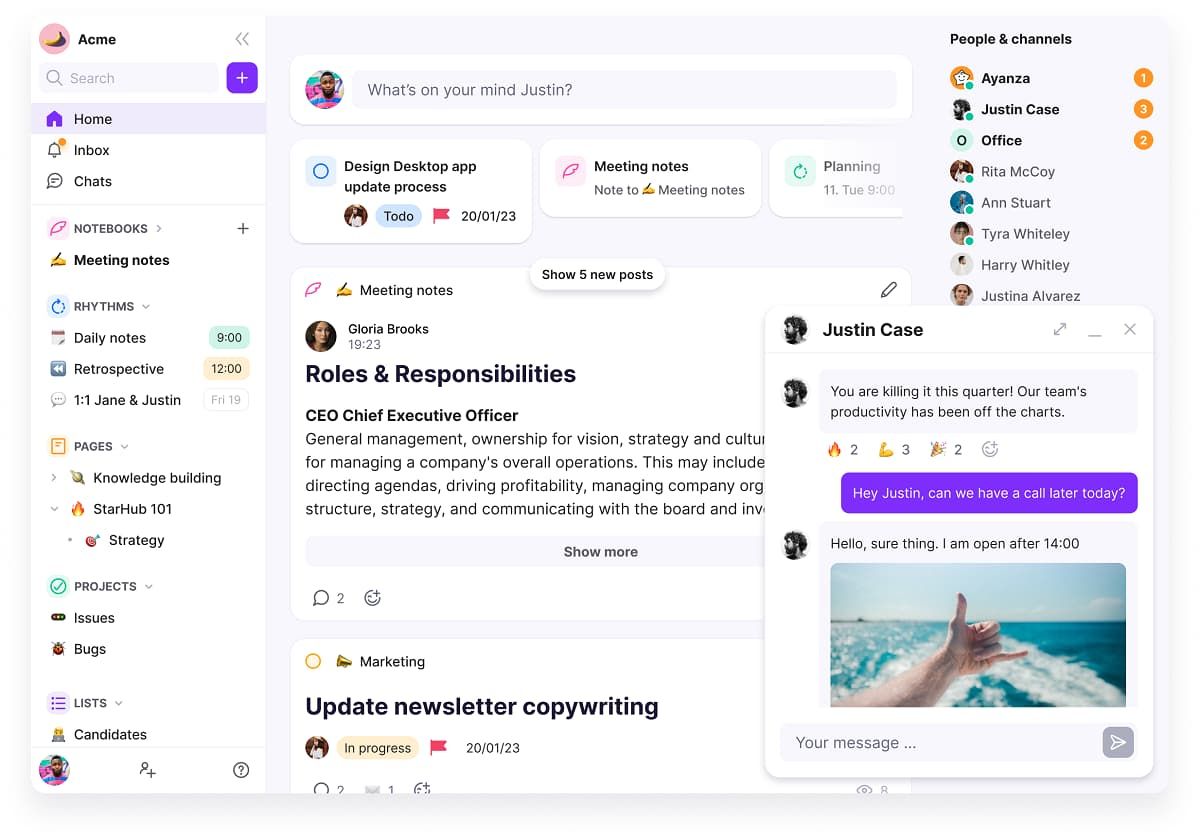
This comprehensive task management and project management tool helps streamline all business processes, emphasizing OKR creation, team collaboration, business strategy development, and tracking progress.
It’s a centralized project management tool with AI capabilities that lets you create a knowledge base where teams can share information and stay updated. You can use Ayanza as an AI knowledge management system to bring all your company data under one roof.
🚀 Best for
Ayanza is a versatile project management solution suitable for companies of all sizes that want to improve team collaboration and help achieve deadlines.
✨ Features
- Real-time collaboration features;
- Task creation and management;
- Strategic insights;
- Automate management and resource scheduling;
- AI assistant and generative AI capabilities;
- Project roadmaps;
- Newsfeed view.
**➕
Pros**
- AI capabilities;
- Affordable;
- Easy to use;
- Flexible and customizable;
- Real-time updates;
- Doesn’t require additional training;
- Scalable.
➖ Cons
- Users might require more learning to interpret insights accurately depending on the process being monitored.
💸 Pricing
- Starter plan: free for up to 10 users
- Pro plan: $6 per month per user
- Enterprise: customized pricing
2. Scoro
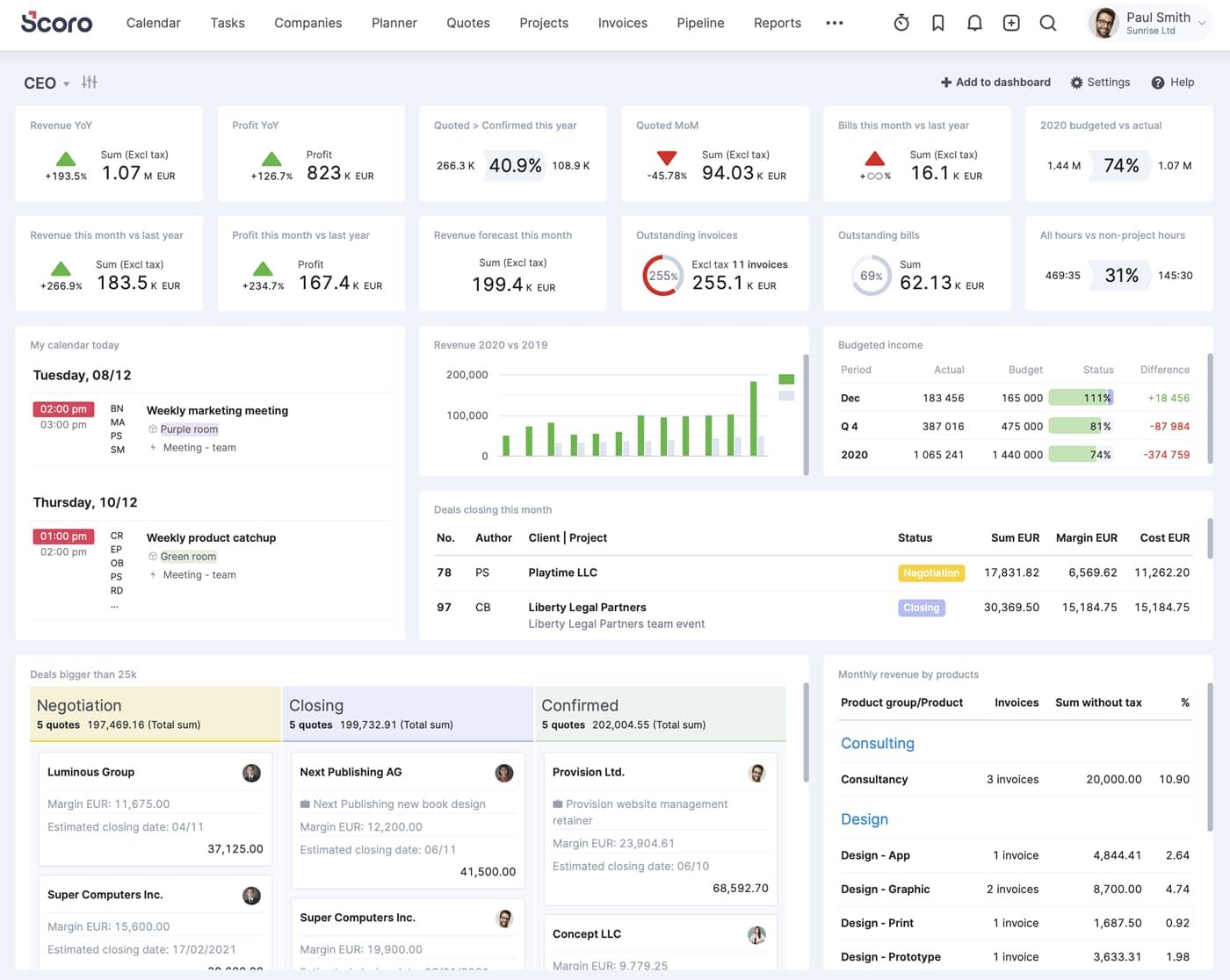
An end-to-end work management tool designed to streamline project management, optimize resource utilization, automate billing, and simplify quoting.
It excels at helping organizations maximize the use of their time and allocate resources effectively.
🚀 Best for
Scoro is best for professional service companies, consultancies, legal services, marketing organizations, and agencies.
✨ Features
- Real-time dashboards and reporting;
- Extensive range of integrations;
- Financial management module;
- CRM and sales;
- Project management features;
- Time management capabilities.
**➕
Pros**
- Great planning and budgeting features.
- User-friendly interface with a fresh look.
- Capable onboarding experts that help set up everything and train employees.
➖ Cons
- Limited mobile app;
- Requires training;
- Expensive for larger companies.
💸 Pricing
- Essential plan: $26 per month per user
- Standard plan: $37 per month per user
- Pro plan: $63 per month per user
- Ultimate plan: custom pricing
3. HubSpot Operations Hub
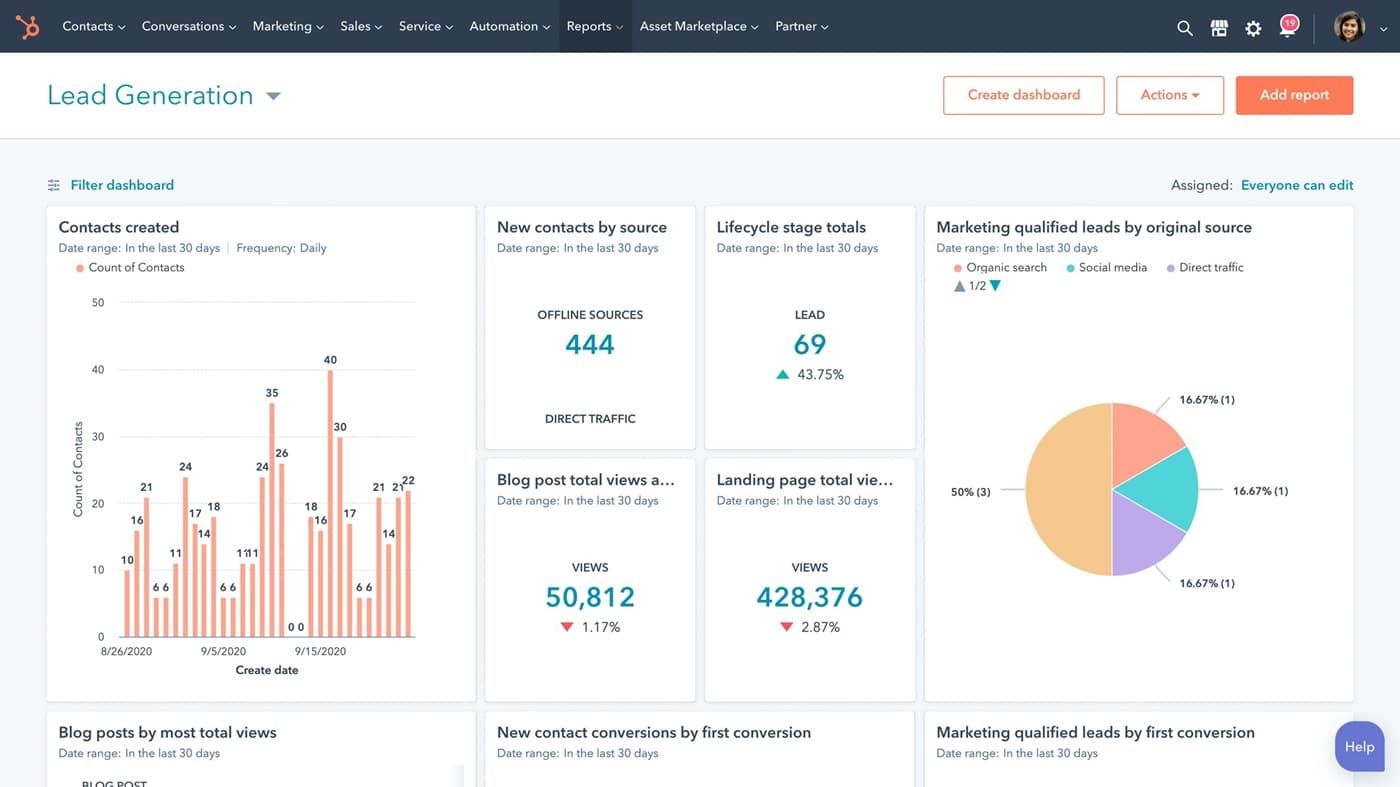
The HubSpot Operations Hub is a part of the HubSpot ecosystem, designed specifically for operations management.
It’s designed for companies of all sizes and helps with scaling, automating workflows, and data management.
🚀 Best for
Companies that already use HubSpot or organizations looking for a complete suite of tools.
✨ Features
- Programmable automation;
- Data quality features;
- Data curation tools;
- Data syncing ;
- Unified view of all customer interactions.
**➕
Pros**
- Over 1,5000 integrations;
- Programmable bots and automation;
- Webhooks;
- Reliable customer support with multiple channels.
➖ Cons
- Can be used only with HubSpot’s CRM;
- It has a limited free plan, and the paid option is expensive;
- Requires time setting it up.
💸 Pricing
- Free plan
- Starter plan: $45 per month
- Professional plan: $720 per month
- Enterprise plan: $2,000 per month
4. Monday
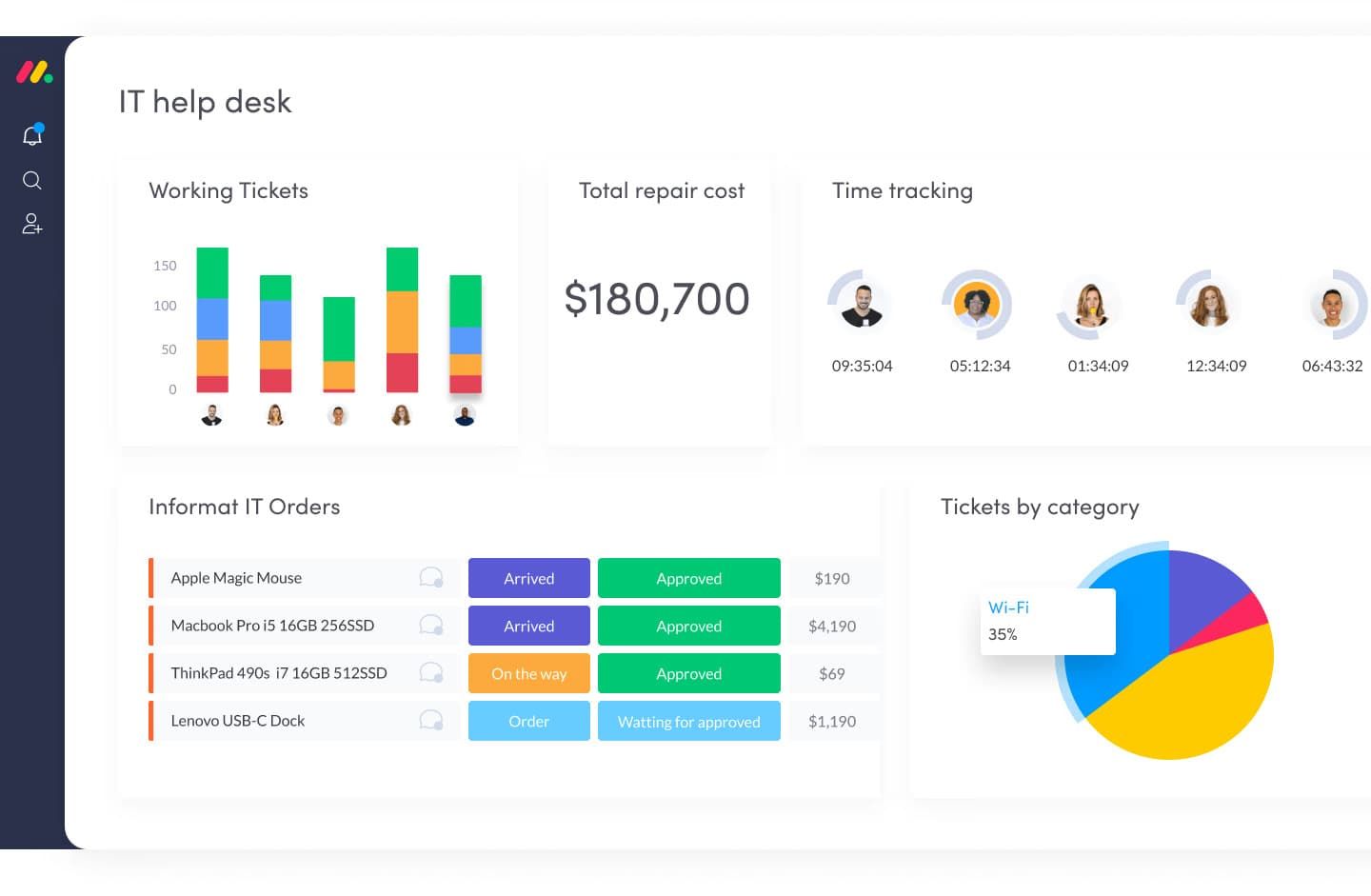
This online collaboration tool is designed to help teams organize and track their projects. It’s not a project management app but a collection of customizable spreadsheets used for logging tasks.
Users can also update tasks and create status reports.
🚀 Best for
Monday is customizable and can be used by any organization that needs to run workflows, assign tasks, track time, or track progress.
✨ Features
- Data visualization;
- Dashboards;
- Project automation;
- Apps marketplace;
- Many integrations.
**➕
Pros**
- Modern user interface;
- Customization options;
- Automation;
- Many templates.
➖ Cons
- Inconsistent navigation options;
- Confusing plans and pricing;
- Not the simplest tool.
💸 Pricing
- Free plan
- Basic plan: $8 per month per user
- Standard plan: $10 per month per user
- Pro plan: $18 per month per user
- Enterprise plan: custom pricing
5. ClickUp
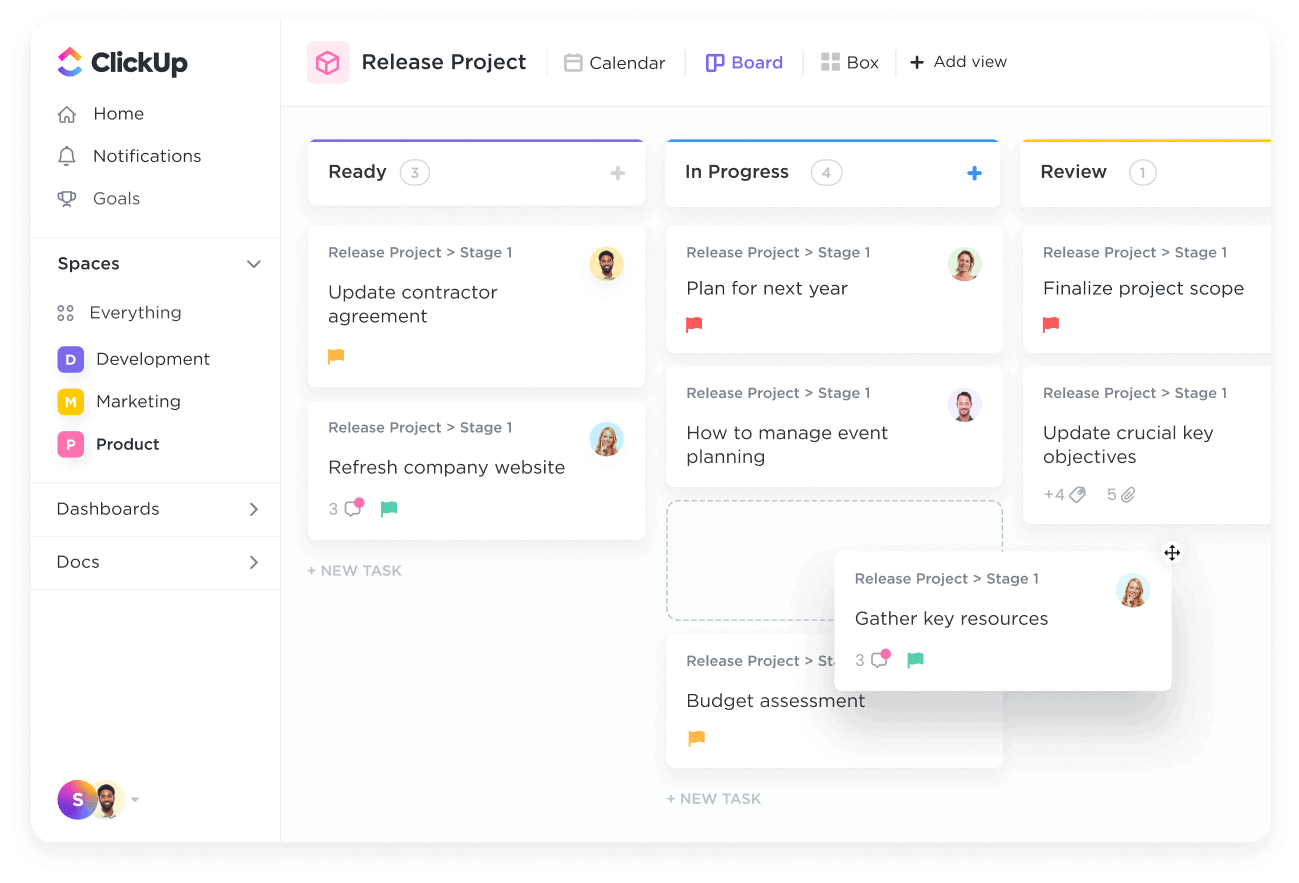
ClickUp is a versatile all-in-one solution project management software suitable for individuals and teams.
It’s equipped with powerful business application features that let companies consolidate operational and project data in a single platform.
🚀 Best for
Teams looking to bring all their operations into a single location with asynchronous collaboration, communication, and project management.
✨ Features
- 15 view types;
- Comment tagging;
- Time management capabilities;
- Collaboration features.
**➕
Pros**
- Over 1,000 integrations;
- Suitable for all operations management operations, including project management, HR, and inventory management;
- Many customizable task management tool services.
➖ Cons
- Limited capabilities on mobile devices;
- Has annoying reminders;
- Requires extensive training and experience.
💸 Pricing
- Free plan
- Unlimited plan: $10 per user per month
- Business plan: $19 per user per month
- Enterprise plan: custom pricing
6. NetSuite
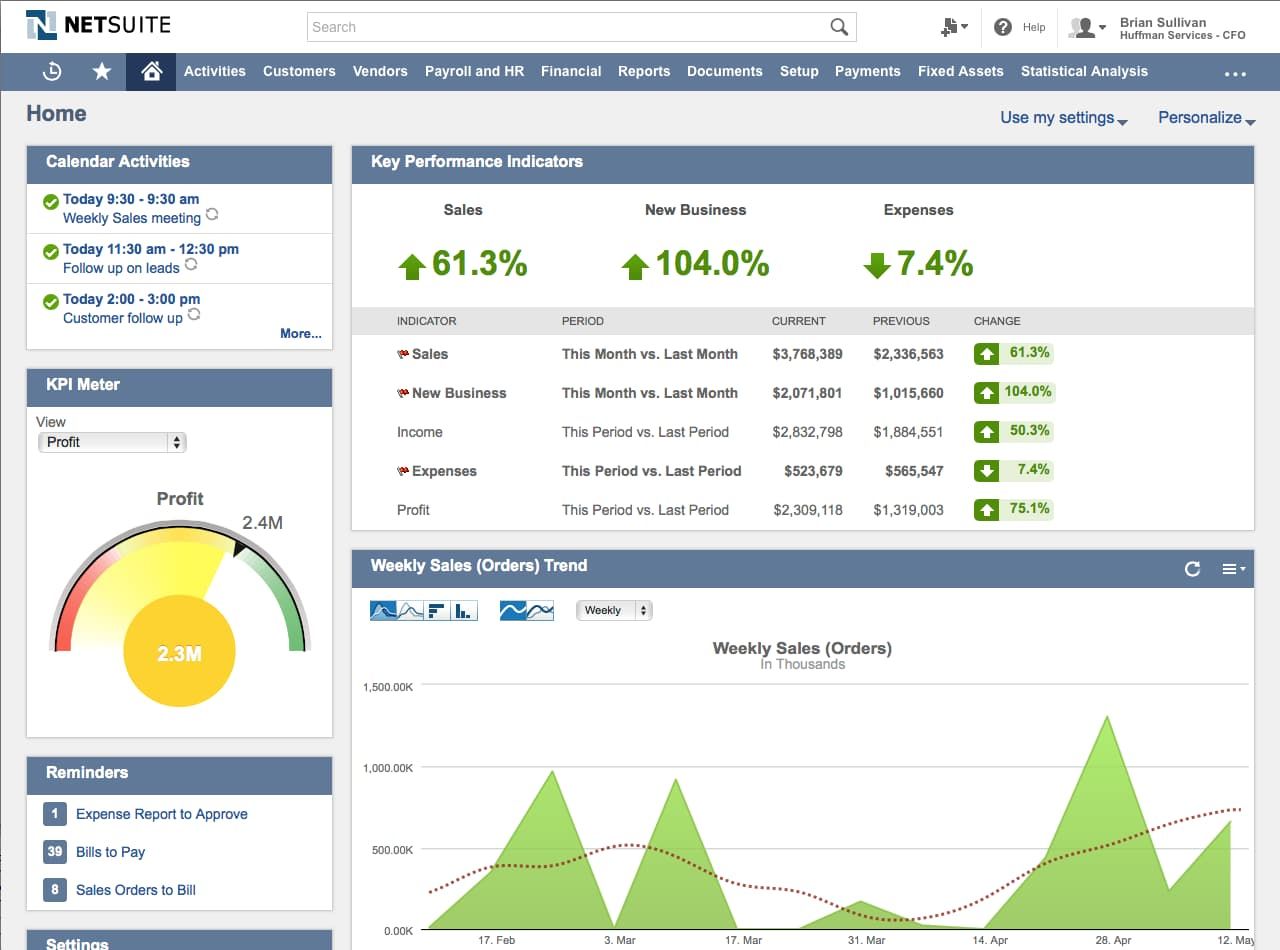
NetSuite is an operations management tool focused on financial performance aspects. It’s a cloud-based solution that allows businesses to manage customer relationships, operations, and finances with extensive features.
It’s a flexible and scalable solution suitable for businesses of all sizes.
🚀 Best for
NetSuite is a great option for companies that want a supply chain and operations management tool in a single solution.
✨ Features
- It can be used for managing financial consolidation, financing, and planning;
- Easy scalability;
- Complete data visibility in real-time for making data-backed decisions.
**➕
Pros**
- Easy financial planning;
- Automated data input;
- Complete overview of finances and supply chain;
- Customizable dashboards;
- Improves decision-making.
➖ Cons
- Occasional stutters and sluggish performance;
- Complex and requires employee training;
- Customization requires experience and advanced knowledge.
💸 Pricing
NetSuite doesn’t have a fixed pricing plan, so visit the official NetSuite site to get a quote for your needs based on the modules you select.
7. Zoho Desk
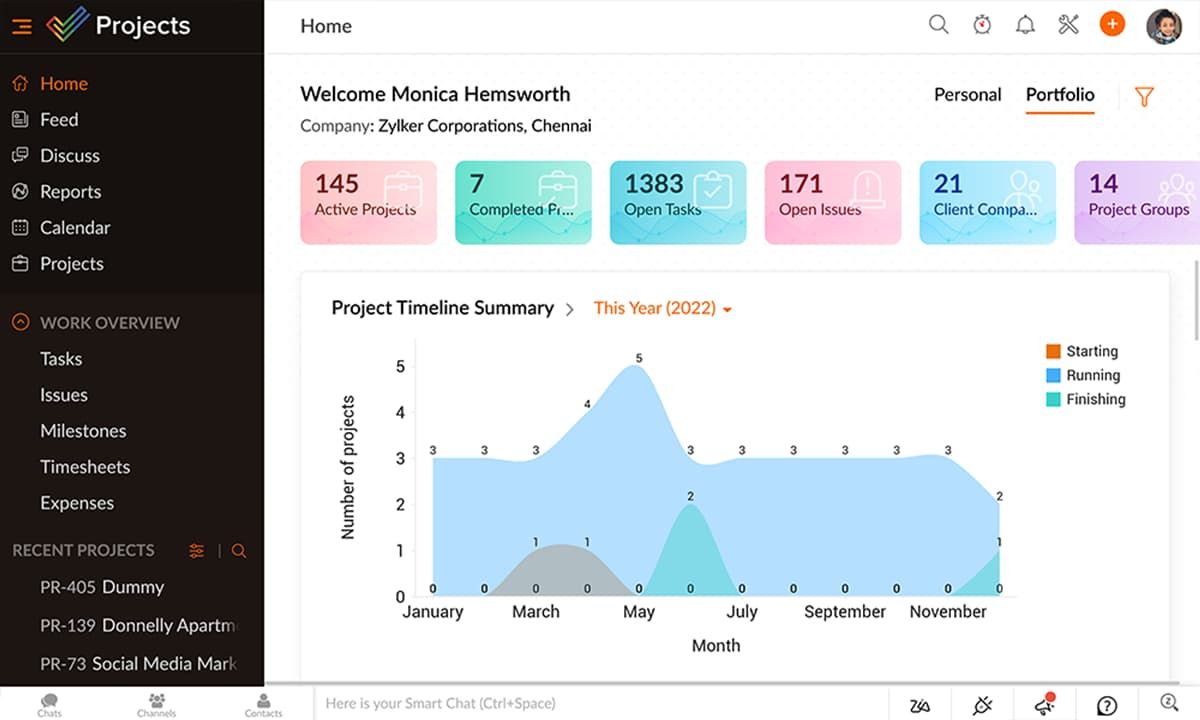
Zoho Desk is an advanced help desk tool that can be used for operations management because of its large number of features you can use to streamline processes and understand their outcomes in regard to customer happiness.
🚀 Best for
Zoho Desk is a great tool for growing small businesses focused on keeping customers happy.
✨ Features
- Extensive ticket management;
- Data exporting and reporting;
- Email ticketing;
- Customer management;
- Knowledge base;
- Customization;
- Insights;
- Marketing automation.
**➕
Pros**
- A large number of features;
- Highly customizable and configurable;
- Good price;
- Has many integrations with Zoho products.
➖ Cons
- Advanced features are available with more expensive plans;
- The user interface could be more modern;
- Customizations can be complex.
💸 Pricing
- Standard plan: $14 per month per user
- Professional plan: $23 per month per user
- Enterprise plan: $40 per month per user
8. Process Street
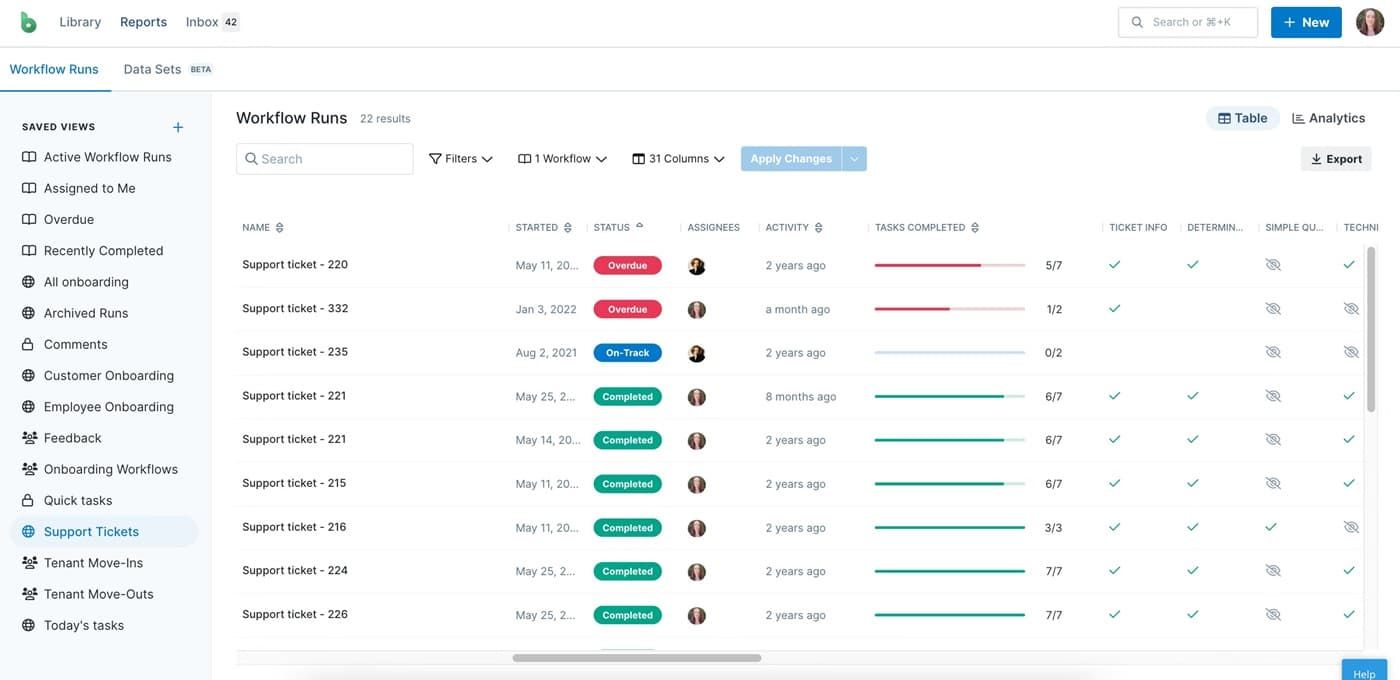
Process Street is an AI-powered process management platform that helps teams share processes and transform them into workflows. It’s designed to be used as a workflow, BPNm, and project management tool.
🚀 Best for
Very versatile but best suited for business models like Accenture, Spotify, and Airbnb.
✨ Features
- Create processes with conditional logic;
- Knowledge base;
- Customizable checklists;
- Collaboration tools.
**➕
Pros**
- Many templates;
- Reliable customer support;
- Rich features (advanced feature upgrades);
- Intuitive user interface.
➖ Cons
- No mobile app for Andorid;
- The free trial is very limited.
💸 Pricing
- Startup plan: $100 per month
- Pro plan: $415 per month
- Enterprise plan: $1,660 per month
9. Odoo
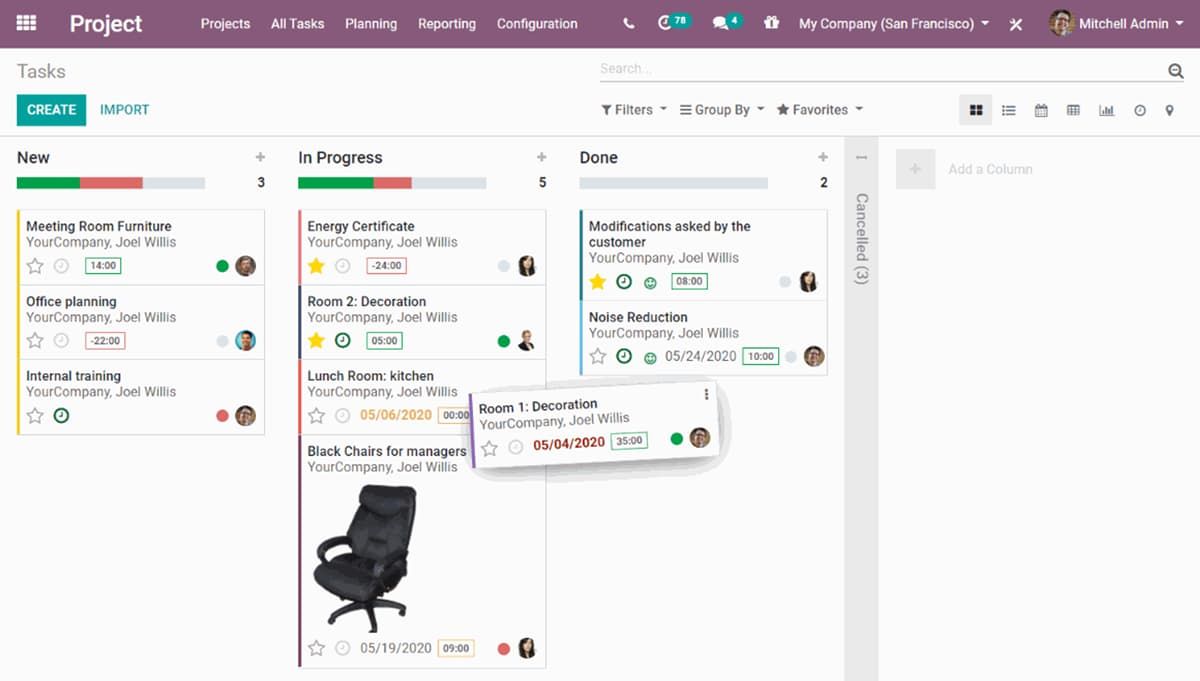
Odoo is an ERP tool that can be used for integrating multiple business apps into a single platform. It has an open-source model, meaning that there’s constant innovation and customization potential.
Odoo is a flexible solution with various functions for accounting, HR, marketing, and sales teams.
🚀 Best for
Oddo is best for large enterprises and businesses that use a large number of apps and have the need to create a cohesive digital ecosystem. Organizations that want to integrate different departments without paying for apps separately should consider Oddo.
✨ Features
- Inventory management;
- Supply chain management;
- Sales management;
- Financial oversight;
- E-commerce platform;
- Accounting tool features.
**➕
Pros**
- Centralized overview;
- Open-source model;
- Cost-saving;
- Customization and innovation options.
➖ Cons
- Pricing doesn’t change when adding or removing users;
- You get the annual discounts only for the first years;
- You can only use one app with the free version.
💸 Pricing
- Free plan
- Standard plan: $11.90 per user per month
- Custom plan: $17,90 per user per month
10. Trello
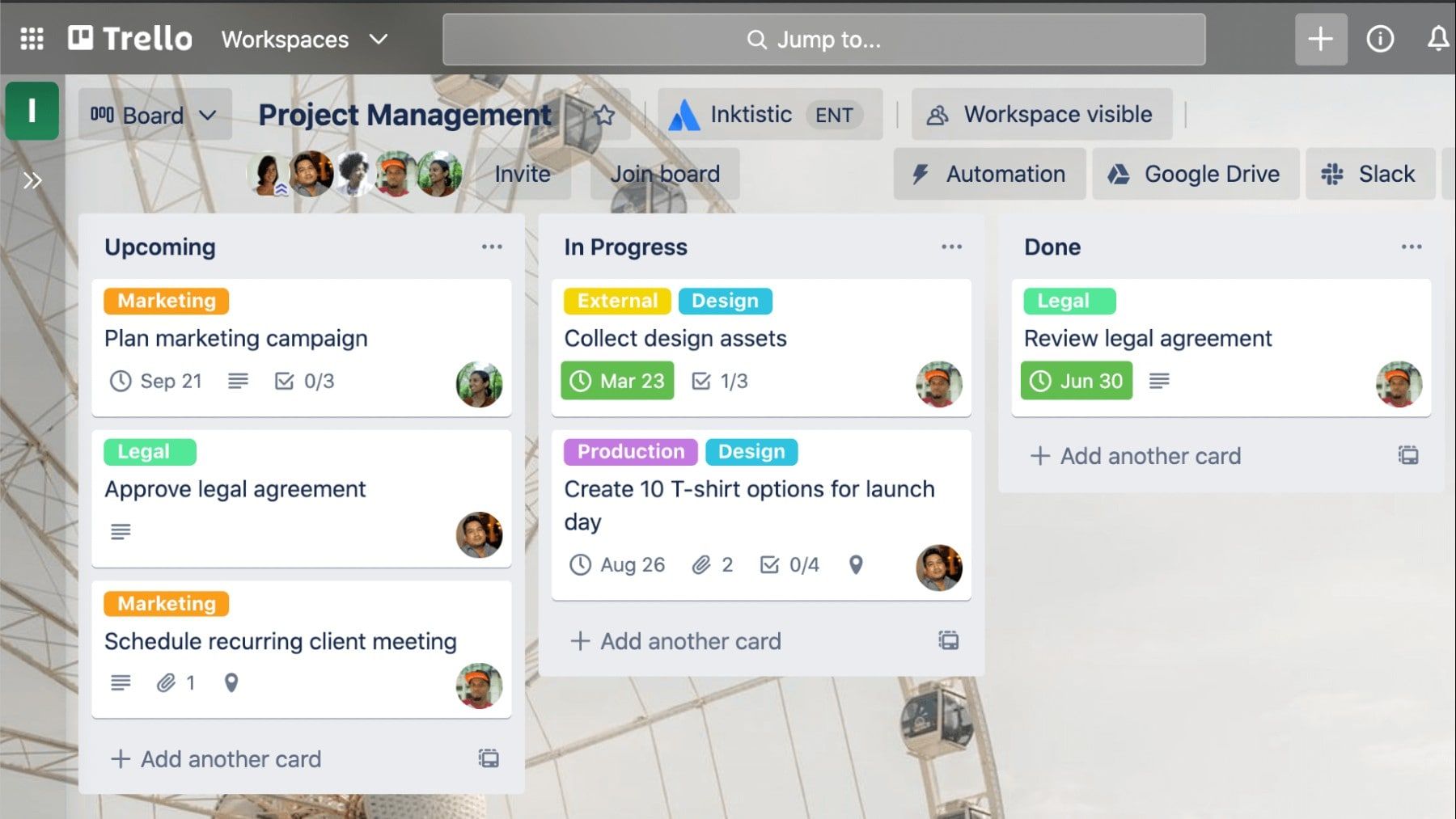
Trello is one of the most known project management systems known for its collaboration capabilities, timelines, file sharing, and workload management.
It has a Kanban design, and it’s really easy to use with a card-based system that’s made this tool famous.
🚀 Best for
Trello is best for small organizations looking for a free tool to help them get set up while integrating some of the most common tools companies use.
✨ Features
- Almost 200 integrations;
- Many premade templates with customization options;
- Extensive automation capabilities;
- Power-up features;
- Over a dozen different views.
**➕
Pros**
- Great free plan with various capabilities;
- Drag-and-drop system;
- Project timelines;
- Calendars.
➖ Cons
- Kanban boards aren’t ideal for all projects;
- Keeping track of multiple projects can be challenging;
- Limited uploads with the free plan.
💸 Pricing
- Free plan
- Standard plan: $5 per user per month
- Premium plan: $10 per user per month
- Enterprise plan: $17.50 per user per month
11. SafetyCulture
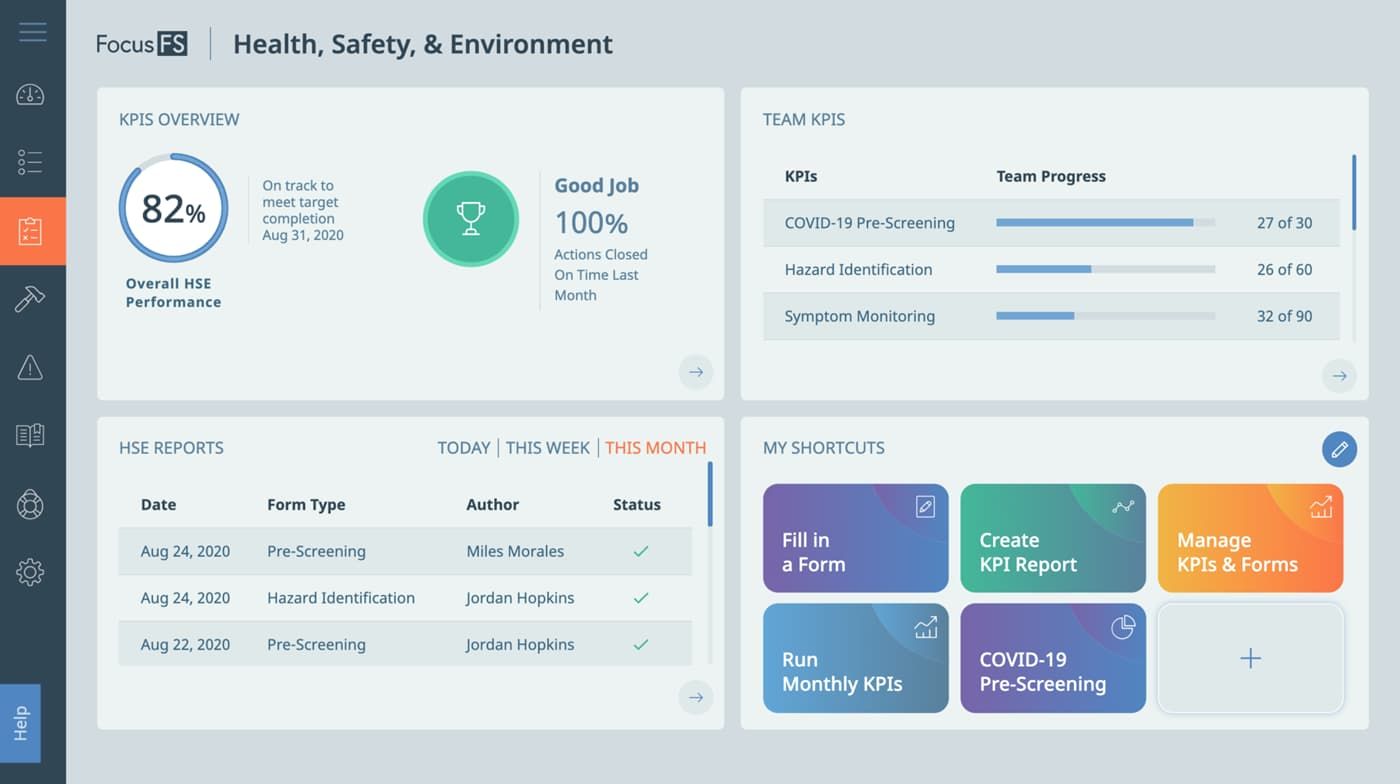
SafetyCulture, or iAuditor, is an inspection tool that enables companies to manage safety and quality concerns.
This tool is used for auditing and inspecting sites while allowing managers to conduct inspections, file reports, and create checklists.
🚀 Best for
This tool is best for companies working in industries like manufacturing, aviation, transport, logistics, retail, hospitality, construction, mining, and engineering.
✨ Features
- API;
- Escalation and alerts;
- Notifications;
- Auditing and audit planning;
- Asset tracking;
- Appointment management.
**➕
Pros**
- Familiar platform similar to Google Forms;
- Clearly defined steps;
- Mobile support;
- Template builder;
- Smart form creation.
➖ Cons
- No advanced functionalities;
- The review editing menu can be tricky to navigate;
- Reporting can be glitchy.
💸 Pricing
- Free plan
- Premium plan: $24 per user per month
- Enterprise: custom pricing
12. Cflow
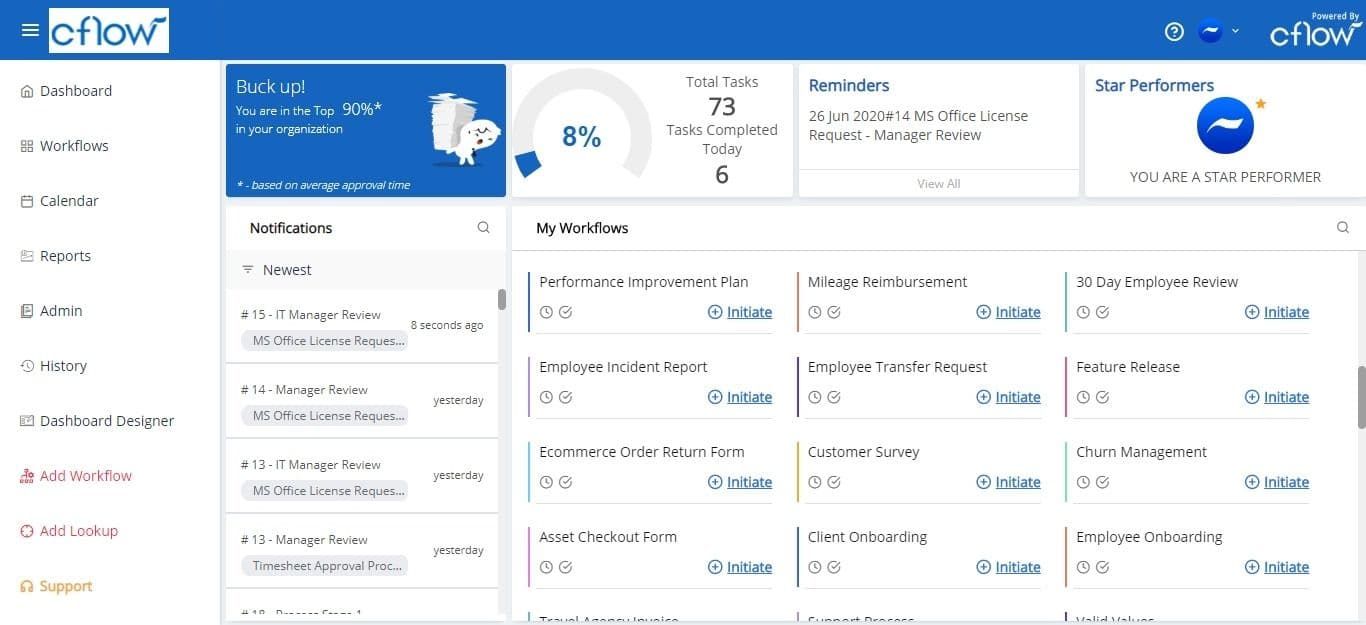
Cflow is a comprehensive workflow automation solution designed for stealing business processes, removing human errors, reducing paperwork, and keeping projects on track. An intuitive WYSIWYG designer allows users to create workflows with a simple drag-and-drop system.
Cflow has a powerful API integration that allows users to connect the tool with Zapier and other popular tools using custom connectors, webhooks, web services, etc. This is a multi-device tool, meaning that you can add an additional user to build workflows online and access them through a mobile app while on the go for approvals and reviews.
🚀 Best for
Cflow is a comprehensive business process automation tool and operations management solution designed for small, medium, and enterprise organizations that want to switch from spreadsheets and emails to automated applications.
✨ Features
- API;
- Drag & drop form builder;
- Notifications and routing;
- Workflow process customization;
- Analytics and reporting capabilities;
**➕
Pros**
- Has a capable workflow template builder;
- Allows task assignment based on user role;
- Dynamic task delegation capabilities;
➖ Cons
- No free plans;
- Can’t add guest users;
- The interface can sometimes be confusing;
💸 Pricing
- Happy Plan: $12 per user per month
- Joy Plan: $16 per user per month
- Bliss Plan: $22 per user per month
Top 5 business operations management software compared
| BOM Tool | Free Trial | Price | Business Features |
|---|---|---|---|
| Ayanza | Free plan and a free demo | $6 per month per user | AI assistant, generative AI, task creation, automated management, task management, collaboration, built-in time tracking; |
| HubSpot Operations Hub | Free plan | $45 per month | Data curation, data syncing, programmable automation; |
| ClickUp | Free plan | $10 per use per month | Time management, 15 views, comment tagging; |
| NetSuite | 14-day free trial | Custom pricing | Complete visibility, scalability, and financial consolidation features; |
| Trello | 14-day free trial, free plan | $5 per user per month | 200 integrations, premade templates, power-up features; |
What to ask the provider on a demo call about business operations management tools
Even though some business operations management tools are objectively better, there’s no one-size-fits-all solution. In other words, every business is different and has its own goals, structure, processes, workflows, etc. That’s why it’s best to request a demo and book a call so you can closely learn about the tool and how it works before deciding.
Here are some of the questions you should ask during the demo:
- Talk about your pain points and ask how the tool can help deal with them.
- What integrations are available?
- What kind of customer support do you offer?
- How can business operations management be implemented in our current ecosystem?
- What operations management needs can be addressed with your tool? (supply chain management, inventory management, task management, etc.)
Efficient implementation of business management software solutions for operations managers
Implementing business operations management software effectively is important as it ensures you meet all the standard and regulatory requirements while avoiding common pitfalls that will lead to downtime and inefficient processes.
Here are the stages of efficient implementation:
- The business owner and leaders must set the goal and vision for using business operations management tools and create a plan for implementing it. Understand the gaps and current situation and identify key priority areas that should be improved.
- Aligning the desired goals and future outcomes with the organizational structures and design approach.
- Managers and leaders must manage and monitor the implementation while handling operational gap assessments, employee training, and organizational communication.
- Key players must implement improvements, prioritize, and plan actions for adjusting the implementation while tracking every key performance indicator.
The most common user types of business operations management software
All types of businesses can benefit from using operations management software regardless of their industry, niche, sector, size, or business model. However, different individuals or teams within the organization can use operations management tools to facilitate different results and functions.
Common users of business operations management software:
- Operations managers;
- Project managers;
- Supervisors;
- HR managers.
All those who need tools to help them create systematic approaches for efficient service operations updates and production coordination can benefit from business operations management software.
Software types that integrate with business operations management tools
Integrations are essential as they allow you to use different programs within a single workflow without switching between programs and performing a manual process.
Some of the most important integration tools for a business operations management tool include:
- Project management tools;
- Customer relationship management software;
- Spreadsheet tools;
- Calendars;
- Financial management tools;
- Inventory management tools;
- HR tools;
- Automation tools.
The latest trends and insights in business management software solutions for operations managers
The opportunities and challenges of operations management are constantly changing. Since there’s an imperative to digitalizing these processes and using a business operations management software solution, many emerging trends regarding the tools used exist.
Here are some of the latest trends you should keep in mind:
The role of automation keeps growing
Automation is key in operations management as it ensures employee productivity, reduces errors, and removes manual tasks. Automation allows an operations manager or project manager to oversee their employees while focusing on their core tasks.
Around 80% of companies invest in process automation, while around 66% have automated at least one. At the same time, 70% of managerial work (according to Gartner analysis) is expected to be automated during 2024, including business operations management.
Growth of unified operations management tools
The era of using a different operations management software system for each process is slowly ending. There’s a growing need for platforms with seamless automation tools, communication features, workflow management, project management, task management, and project scheduling.
Not only are the business operations management tools offering versatile features, but they are expanding possible integrations designed to create a unified operations management platform for efficiency, reduced training, and a unified overview.
ML and AI
Machine learning and artificial intelligence have tremendously improved in the past decade. AI tech has brought advancements in automation and robotics, impacting all aspects of business, including supply chain operations and other business operations.
Business operations can leverage smart technologies for prediction, analysis, and real-time update sorting and data collection. New operations management tools include various AI and automation tools that can help them streamline operations and get valuable insights.
Embrace efficiency with business operations management software
Business operations management tools allow companies to reach their full potential. Tools like Ayanza help save money, energy, and time, increasing profits and production. These modern tools make all processes easier and deliver a wide range of AI technologies you can leverage to maximize your resources.
Before selecting software for your organization, take the time to try out the free version and see what it’s all about. If possible, get a demo where you can ask important questions about the solution.
FAQ
How does business operations management software help
streamline business processes
?
Operations management tools streamline processes through project management tools, manual task automation, workflow management, racking key performance indicators, team collaboration, real-time insights, employee performance tracking, inventory tracking, expense tracking, etc.
What are the potential
cost savings
associated with using business operations management software?
Business operations management software reduces costs by eliminating errors, streaming processes, automating mundane tasks, and providing valuable real-time insights on improving operations.
How do business operations management tools support
supply chain management and inventory control
?
Business operations management tools support these processes by reducing operational costs, improving control over the process, reducing risks through tracking, improving communication, real-time analysis, providing business intelligence, forecasting, and improving decision-making.
What are the
scalability options
for businesses that grow after implementing this software?
A modern business operations management system centralizes all processes into a single platform but decentralizes control and access. Employees can manage processes and handle tasks with the right permissions management, allowing everyone to help with the organization’s growing needs.
Furthermore, most modern tools are cloud-based, meaning companies can quickly expand their plans and add additional users to their platforms. Having everything at a single location also makes integrating relevant tools easier, onboarding employees, and training people to facilitate growing needs.
Can business management software solutions for operations managers be accessed and
used remotely
by employees and teams?
Yes, most modern business management software solutions are cloud-based and come with permission settings and access control, allowing everyone to use the tools they need and get important information. If you have a remote team, you can always rely on these tools to get everyone on board with your processes.
What
training and support options
are typically offered with business operations management software?
Companies providing business operations management software offer comprehensive training programs, documentation, demos, and real-time support.
Is a
trial period or demo
available for business operations management tools before purchasing?
Yes, most business operations management tools providers offer free trials, demos, and free plans companies can use to learn about their solutions before committing.
What is the
best business operations management software?
There’s no one-size-fits-all solution that works best for all businesses. However, some of the best tools are Ayanza, ClickUp, NetSuite, and Trello.


